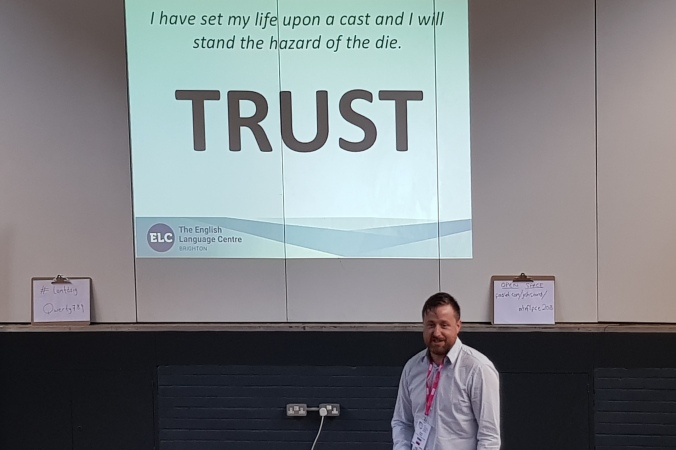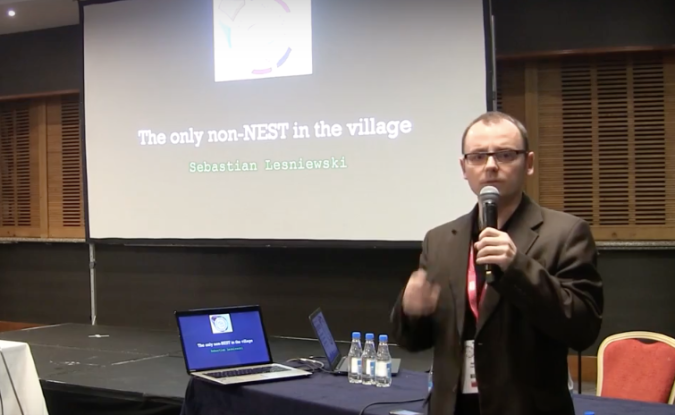This post is mostly about academic management: the first five sessions look at the professional development of teachers from a manager’s perspective, though there is a huge overlap with the CPD strand (coming tomorrow); the last two focus on customer experience. I’ve also included the pre-conference presentations: before, I focused on my impressions; now it’s time for the contents. If any of the sessions interest you, the photos of slides and more comments are available here. Or you might just decide to contact the presenters!
1. PR for PD: Harnessing individual energy to empower institutions in teacher development / Clare Magee & Fiona Wiebusch (PCE)

Clare and Fiona offered alternatives to the ‘Friday workshop model’ and insisted that teachers only need space, time and money, and that the managers simply need to provide these and get out of the way (a common, slightly controversial, thread in many presentations this year). That said, they had a lot of interesting options to suggest to teachers, focusing on space, or Platforms: face-to-face (tea room, meetELT in a pub, 1-day TD fest); peer-to-peer (peer partnerships, pineapple charts for observations) ; digital (e-News, social media). I particularly liked the idea of Passion Platforms and would like to find out more. An idea for a future post, perhaps!
2. Trusting Practitioners / Ed Russell (PCE)

Ed had cool ideas about how to engage very experienced teachers with niche interests – and of course building trust and good relationships. Teachers are invited to think about a very concrete teaching issue (puzzle) and share in a PDG (Personal Development Group).
There are 5 stages:
- Identify a puzzle and form a question
- Review literature and watch colleagues, decide on your action
- Share the plan with the PDG, get feedback
- Do what you planned to do and keep a record
- Reflect on the experience and share.
I like how the focus is moved to the individual, but at the same time the manager provides structural support. It would be nice to know what happens next.
3. Culture Change in ELT Staff Rooms / Liam Tyrrell (PCE)

Using examples from his own management experience, Liam spoke about the general approach to changing the culture in the staff room:
- Picture the desired change
- Find your allies and engage the Silent Majority
- Give the teachers a lot of choice, but don’t control too much, just ‘take the admin heat’
- Recruit people who fit well with the culture
‘Taking the admin heat’ is one of those missing components in the grass-roots teacher development: yes, we should offer a lot of opportunities and ‘let them run with it’, but relinquishing all control is not really helpful. (So true!)
4. What IS there to offer teachers in the happiest country on earth? / Ania Kolbuszewska (PCE)

Ania spoke about introducing a new CPD concept in Switzerland, in a multilingual and multicultural environment. Even though my context is very different, I found her approach very useful: begin by observing teachers in action, ensure that you all speak the same language (agree on terms), be aware of cultural differences and try to minimise misunderstandings (using top-down strategies if necessary).
5. Creating a culture of CPD, centre-wide, brand-wide, company-wide / Oliver Beaumont & Duncan Jamieson

The presenters compared professional development to a garden (and ‘sprayed’ us with a yellow watering can!) On a more serious level, they highlighted the importance of sustained development, with feedback and coaching, and shared three CPD schemes they use:
- Flash training (teachers are asked: ‘How do you…’ and analyse their practice; have very quick input; decide what you’ll do this week; reflect). All this should take place within one week and not take longer than 20 minutes. I really like the economical approach to time here.
- Personalised Peer Observations (the teacher chooses an observation focus and creates an observation tool before doing a peer observation. Then the observer and observee reflect together and come up with an action plan). I think making their own observation tool is crucial here – could be combined with pineapple charts!
- Academic Flair Development programme (this scheme takes INSETT to a new level by introducing action research and limiting the focus to several topics a year). Something worth looking into.
6. Magic moments: making your students’ experience memorable / Ben Butler

Ben gave us quite a lot of information about managing customer experience and explained the difference between touch points, moments of truth and magic moments. It’s important to see everything that happens to a student as a whole journey, from sales to teaching and operations, and establish a customer service mentality throughout the whole team.
7. The highs and lows of student expectations / Sophia Amaryllis Bennett

Sophia spoke about the forces that pull our students in different directions and whether we can do anything about it: culture, peers, family, goals, as well as changing trends. It’s interesting that the better we do, the better we need to do in future, and should never rest on our laurels. We also discussed very interesting case studies – a great way to internalise the input without leaving the session.
To be continued!



































